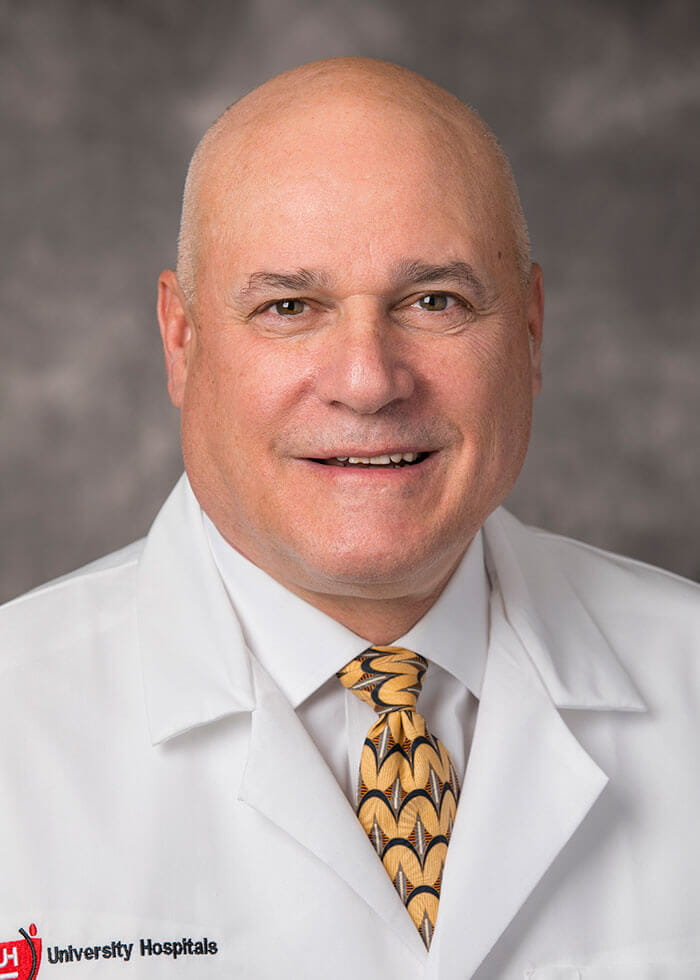Profiles in Clinical Excellence: Trauma and Critical Care
June 26, 2025
UH Clinical Update | June 2025
By Glen Tinkoff MD, FACS, FCCM
Vice Chair, Department of Surgery
System Chief, Trauma and Acute Care Surgery
University Hospitals
 Glen Tinkoff, MD, FACS, FCCM
Glen Tinkoff, MD, FACS, FCCMDivision Chief, Pulmonary, Critical Care and Sleep Medicine
Virginia Hubbell Chair in Pulmonary and Critical Care Medicine
University Hospitals
 Frank Jacono, MD, ATSF
Frank Jacono, MD, ATSF
You don’t plan for trauma. It arrives without warning — an accident on the highway, a fall at home, a sudden act of violence. In those moments, your survival depends on the strength of your local emergency response and the trauma care network behind it.
Trauma is not only a personal emergency — it’s a public health crisis. According to the Centers for Disease Control, traumatic injuries are the fourth leading cause of death in the U.S. and the number one cause for people under 45. They rob families of more productive years of life than any disease, yet trauma care doesn’t always get the attention it deserves.
At UH, we’ve spent the past eight years strengthening our trauma response — starting with our UH Cleveland Medical Center, which in 2017 was verified as a Level 1 trauma center. That designation represents the highest level of trauma care possible, and it means we stand ready 24/7 with the specialists, equipment, and expertise needed to treat the most critically injured patients.
But our commitment extends far beyond our flagship hospital. Through deep collaboration with EMS agencies and partnerships with MetroHealth and Cleveland Clinic, UH has built a regional trauma care network that ensures patients across Northeast Ohio get the right care in the right place at the right time.
In fact, most trauma patients don’t need to be transferred to a Level 1 center. That’s why we’ve invested in trauma care closer to home: seven of our community hospitals —including UH Elyria, UH Geauga, UH Lake West, UH Parma, UH Portage, and UH St. John medical centers, as well as our partner Southwest General — are now verified as Level 3 trauma centers. Together, they care for thousands of injured patients each year with skill, speed, and compassion.
When needed, our Transfer Referral Center seamlessly connects those hospitals with UH Cleveland Medical Center, initiating rapid transfers for patients who need more advanced care. The result is a trauma system that works as one — saving lives across our region every day.
Caring for a Patient in Crisis: The Quiet Power of Critical Care
When a patient is too sick to be cared for in the regular part of the hospital, another highly specialized group often takes over: our critical care teams.
Critical care doesn’t often make headlines. You won’t see billboards advertising the ICU. But make no mistake — when a patient’s condition turns life-threatening, it’s the critical care team that steps in to provide complex interventions, advanced monitoring, and round-the-clock support. They’re the safety net behind everything we do.
Whether it’s a patient in respiratory failure, someone recovering from trauma or emergency surgery, or complications from cancer treatment or sepsis, these teams are the ones who manage it all — often unseen, but always essential.
Critical care is not a solo act. It’s a finely tuned orchestra of ICU nurses, respiratory therapists, pharmacists, dietitians, physical and occupational therapists, APPs, and physician specialists. And at the center are intensivists — doctors specially trained to care for our sickest patients.
This isn’t just happening at UH Cleveland Medical Center. It’s happening every day in our community hospitals, where our integrated, system-wide critical care teams deliver the same high standard of care — keeping patients close to home, family, and the support they need to heal.
It’s easy to take this kind of care for granted, especially if you’ve never needed it. But across our 16-county region, UH’s trauma and critical care teams are always ready. Whether you arrive through the ED, get admitted for a procedure, or become seriously ill while already hospitalized — these teams are here. Their quiet, constant presence may one day save your life or the life of someone you love.
So the next time you pass one of our hospitals, remember: inside, there’s a team working every hour of every day to be there in the moment you’ll need them most — even if you never expect to.


